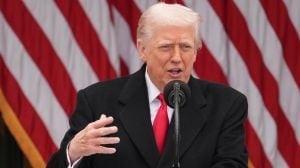UN stamps US role, Iraq sanctions gone
The UN Security Council voted overwhelmingly today to end the 13-year-old sanctions on Iraq and gave the United States and Britain extraordi...

The UN Security Council voted overwhelmingly today to end the 13-year-old sanctions on Iraq and gave the United States and Britain extraordinary powers to run the country and its lucrative oil industry.
Despite misgivings by many council members the 14-0 vote was a victory for the Bush administration, which made some last-minute concessions that opened the door to an independent, albeit limited UN role and the possibility of UN weapons inspectors returning to post-war Iraq.
The only opposition came from Syria, Iraq’s neighbor and the only Arab member of the council. Syria left its seat empty and did not cast a vote in the 15-member council.
‘‘The lifting of sanctions marks a momentous event for the people of Iraq,’’ US Ambassador John Negroponte told the council after the vote. ‘‘It is time for the Iraqi people to benefit from their natural resources.’’
Without UN action to lift the sanctions Washington would have been in a legal no man’s land, with many firms unwilling to engage in trade with Iraq.
Some 8.3 million barrels of Iraqi oil stored at the Turkish Port of Ceyhan can now be exported. ‘‘The oil is ready to flow. The tanks are full,’’ one council diplomat said. The final compromise in the seven-page resolution was an agreement by Washington for a Security Council review within 12 months on the implementation of the resolution. But the measure does not need to be renewed and stays in effect until an internationally recognised Iraqi government is established.
In Paris, US Secretary of State Colin Powell said, ‘‘This is a wonderful day for the people of Iraq.’’ He was attending a meeting of the Group of Eight industrial nations. Also in Paris, British Foreign Secretary Jack Straw said: ‘‘We now face the task of rebuilding Iraq, building it up to a state far better than what went before, under Saddam. And with a bit of luck the international community can now move forward under the United Nations.’’
France, Russia, Germany and France, who voted in favor of the resolution, all said the document was far from perfect.
French Ambassador Jean-Marc de la Sabliere said the resolution provided ‘‘a credible framework within which the international community will be able to lend support for the Iraqi people.’’
Russia’s UN Ambassador, Sergei Lavrov, told the council, ‘‘Definitely, it was a compromise,’’ adding: ‘‘The significance is primarily that it creates an international legal basis for joint efforts to be made by the entire international community to deal with the crisis.’’
And Germany’s UN Ambassador, Gunter Pleuger, said bluntly: ‘‘This resolution is a compromise. It does not fulfill every wish of all parties, but as compared to the initial draft of the co-sponsors, we have achieved substantial improvements.’’
The UN sanctions were imposed a few days after Iraq’s 1990 invasion of Kuwait. But after Saddam’s fall, the United States argued there was no reason for the trade and Financial embargoes to continue.
The resolution would give the United States and Britain broad powers to run Iraq and sell its oil to fund reconstruction. It would also protect Iraq against lawsuits or attachments of its oil revenues until a permanent Iraqi government is established.
The United States signaled its willingness this week to have inspectors from the Vienna-based International Atomic Energy Agency, responsible for nuclear materials, return to Iraq. But the Bush administration is not eager for the return of chemical, biological and missile inspectors, commanded by Hans Blix, who has openly challenged some US assertions.
Britain, however, appeared to disagree. Its UN Ambassador, Sir Jeremy Greenstock, said among the issues the Security Council would need to take up in ‘‘due time’’ was the future of the inspection commissions ‘‘as they relate to the complete disarmament of Iraq under previous resolutions’’.
(Irwin Arieff and Bill Rigby contributed to this report) —Reuters


- 01
- 02
- 03
- 04
- 05





























